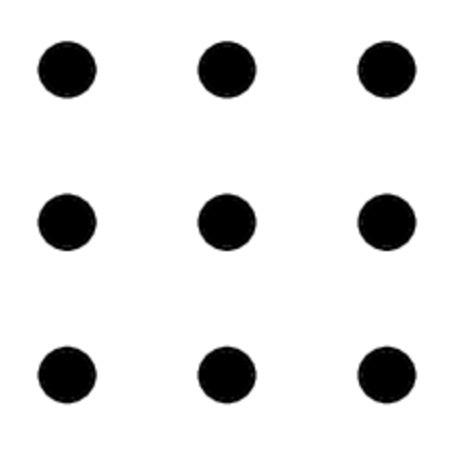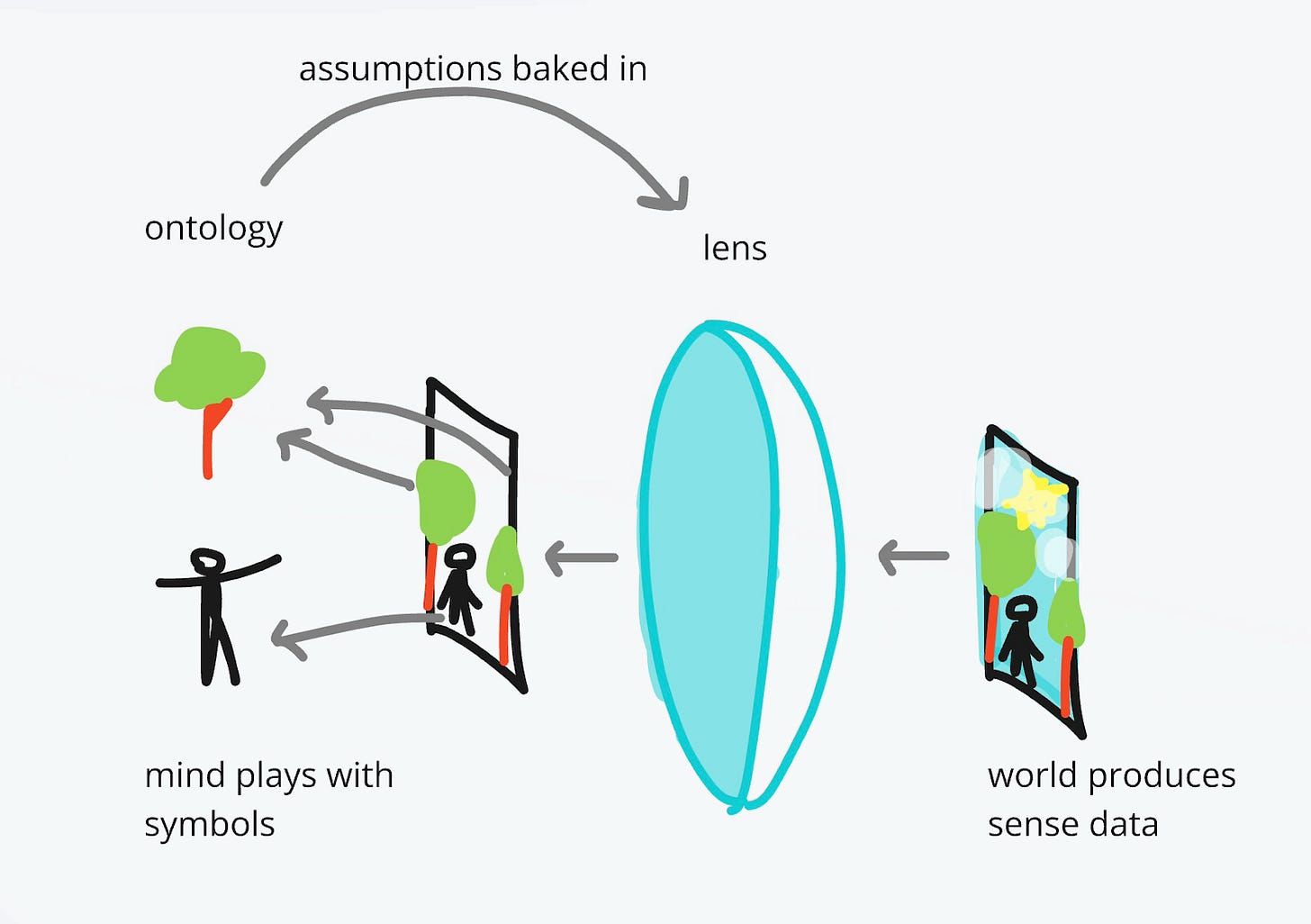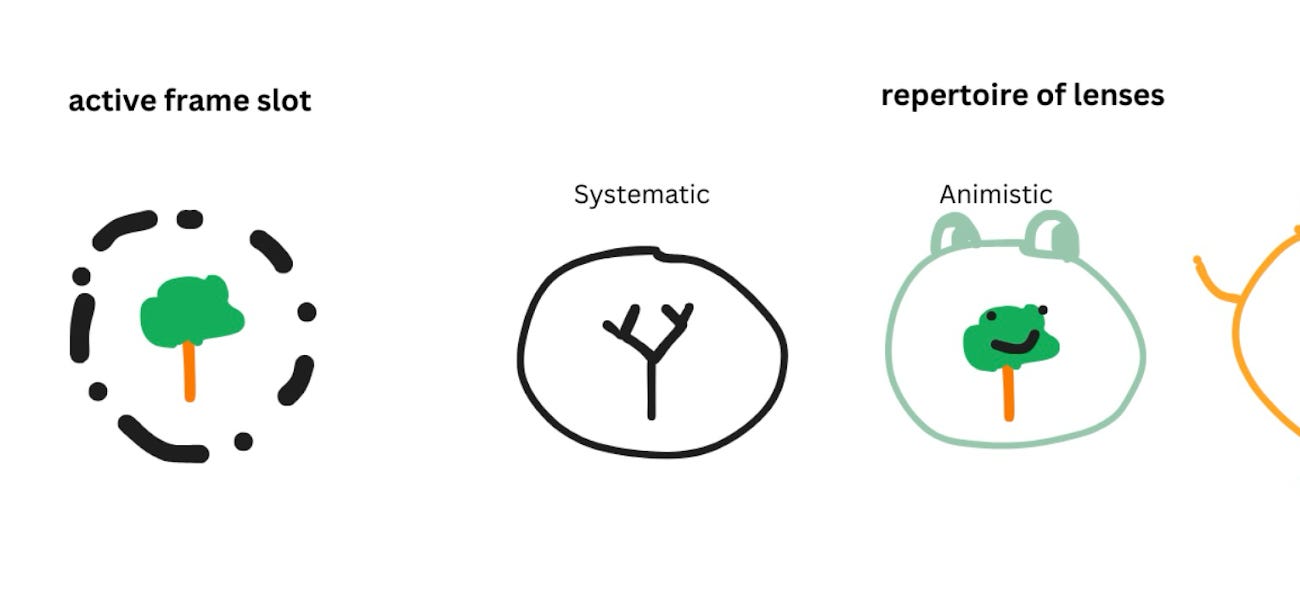Wisdom is Working with Frames (1/2)
What is wisdom, concretely? How can you become wiser?
This post began with me mulling over how we might make AI not just more intelligent, but wiser. Wiser in a way that avoids large-scale errors and notices errors in framing. I think a lot about connecting traditional wisdom to science.
We won’t be thinking much about AI though. It’ll be about a concrete definition of wisdom and how we can become wiser through it.
Half-way through, my favorite cephalopod, the brilliant Octopusyarn joined me in this quest and we co-composted by sharing and selecting research and insights, then crafting separate essays out of them. This is mine, split into two parts.
In Part 1, we’ll define wisdom and frames: I think wisdom is about being good at working with frames. By frame I mean something like a set of assumptions or heuristics, a way of looking at a problem. So being wise is about choosing the right frame one for each context, and noticing when they’re unhelpful. Building them up, tearing them down.
In Part 2 of this essay, we’ll look at how we can become wiser through practices at different depths of knowing!
What is Wisdom?
Thirty years of wisdom research in psychology [1] tell us the concept of wisdom is highly correlated with life-satisfaction and growth.
Many of us have this image of the Daoist sage, gracefully flowing through life doing the exact right thing at the exact right time, effecting change effortlessly, in harmony with their environment. The Daoist sage is wise.
But what separates the wise from the merely intelligent or knowledgeable?
Can we make it concrete and operational?
The dictionary
Merriam-Webster says wisdom is the “ability to discern inner qualities and relationships” and highlights “insight” and “judgment”.
Insight I understand as self-knowledge, meta-cognition, access to our intuition and whims. Judgment I associate with discernment and pragmatism.
Charles Haddon Spurgeon defines it as "the right use of knowledge".
Psychology researchers don’t seem to agree on a definition.
The Psychology of Wisdom
In defining wisdom, the psychology literature [1] usually mentions things like the traits below which I clustered for your convenience:
Doing things
Balancing knowledge and pragmatism
Using appropriate heuristics
Skillfully construing problems
Situational awareness
having self-knowledge of your own cognition
Knowing what to value in life
Taking others' perspectives
Caring about people
Identifying with group welfare
Showing compassion
To my amazement, these clusters roughly matched one conceptualization and operationalization of wisdom that I ended up especially liking.
Monika Ardelt on 3 dimensions of wisdom
Monika Ardelt is a sociologist at the University of Florida who developed a 3-dimensional scale for wisdom. Work done in the 80s by Clayton and Birren surveyed young and old people’s implicit models of wisdom and applied dimensionality reduction to find 3 dimensions: cognitive, reflective and affective (or compassionate). Ardelt measured those 3 dimensions with a self-administered questionnaire and showed the resulting wisdom score was a strong predictor of life satisfaction in old age.
This prompted me to look for operationalizations of wellbeing, which I won’t get into much but would highlight Martin Seligman’s PERMA framework which found 5 elements for individual wellbeing:
Positive emotion: which can only be assessed subjectively
Engagement: flow state
Relationships: friends, family, intimacy
Meaning: Belonging and serving something larger
Achievement: Goals pursued even in the absence of the other factors

Ardelt notes that:
The moment one tries to preserve wisdom (e.g. by writing it down), it loses its connection to a concrete person and transforms into intellectual (theoretical) knowledge. I propose that even the most profound 'wisdom literature' remains intellectual or theoretical knowledge until its inherent wisdom is realized by a person." "Wisdom is in fact a property of individuals".
How does compassion show up?
I can see how the cognitive and reflective dimensions matter and even mutually reinforce in order to increase one’s effectiveness in the world, avoiding large-scale error, and questioning one’s own assumptions.
However compassion was feeling a little trickier to square until I thought of compassion as intrinsic motivation to take the perspectives of others. This makes for a virtuous loop with the other dimensions, where having more perspectives to take makes it easier to feel compassion.
Ardelt gives us a list of traits of wise people. Vervaeke tries to give a “process theory”, an account of how someone becomes wise. We’ll get deeper into becoming wiser in part 2, but for now let’s see what he has to say about the definition of wisdom.
John Vervaeke on Wisdom
Before starting this post, I already had some intuitions about the cognitive science of wisdom, mostly from Vervaeke’s lecture series: Awakening from the Meaning Crisis.
The TLDR is that Vervaeke says wisdom can be seen as the process of adaptively refining your framing of problems at different levels: psychological, cultural, logical, etc.
He also stresses that spiritual traditions have historically developed and offered practices for this purpose. An insight that greatly informs part 2 of this essay.
This 10 minute presentation is a great compression of this chapter [3] where Vervaeke and Ferraro review the literature on wisdom.
Wisdom as skillfully working with frames
John Vervaeke might say something like “the process of wisdom involves seeing through illusion, self-reflection, becoming able to take multiple perspectives, which increases the capacity for Agape (unconditional love), which underlies virtue and meaning.”
(And about meaning he might say it involves the process of sensemaking, feelings of deep connectedness, optimal fited-ness to the environment, at home-ness, and belonging.)
Focusing on the part about seeing through illusion, self-reflection, and taking perspectives, I think wisdom can be fruitfully considered as “skillfully working with frames”. The Agape comes into the picture as mentioned above in the “Compassion” section.
I’ll go into what I mean by frames but first let’s look at an example:
The 9 dot problem:
Connect the dots with four straight lines without lifting the pen.
Most people try and fail at this. Most people will think it's impossible because they assume the lines need to stay within the bounds of the square, when that was not part of the problem statement.
In this case, people were "trapped" by the frame of assumptions they unconsciously selected. A wiser person would have subconsciously selected a looser frame that allowed the degrees of freedom needed to solve the problem.
The reason we become trapped in frames like the 9-dot problem is the same reason we are able to handle so much complexity in the world. We filter the information we receive to attend to only the relevant parts.
What is a frame?
As John Vervaeke puts it, "We're capable because of our ability to ignore so much information. Every bias is a heuristic misfiring, every heuristic is a bias that works in our favor." He adds, "The way you frame the problem is what's preventing you from solving it."
Depending on who I’m talking to, or what examples I’m giving, I’ve been explaining the word “frame” in slightly different ways:
an ontology of possible things,
a set of assumptions or biases or heuristics,
or a lens that filters what information is considered.
But I think they’re all the part of the same picture:
Some frames can be superficial and easy to manipulate as objects, others are deep and unconscious and hard to become aware of.
Some of the frames are biological (sensory input, affordances, even space-time), others are psychological (emotions, motivations, sense of self) and many more are cultural (from language to logic).
Examples of frames:
For my nerds:
There is a connection between Vervaeke and Predictive Processing
One of Vervaeke’s core concepts is the problem of Relevance Realization: the question of how our systems “decide” what to ignore and what to pay attention to.
Vervaeke et al [4] argue that intelligent systems solve this problem with opponent processing, by balancing the pursuit of competing goals. This is in analogy to how the autonomic nervous system regulates arousal by pitting the sympathetic (alert, fight of flight) and parasympathetic (relaxed, safety) subsystems against each other.
Predictive processing and relevance realization [4] gestures at the overlap between relevance realization and predictive processing.
Explaining predictive processing is out of the scope of this post but in short, it describes in math how the brain runs on Bayesian principles, and importantly for this connection, on cybernetic principles. That is, it intricately combines bottom-up sense-data and top-down (Bayesian) expectations. Can you see how this sounds like "opponent processing"?
They compare how both frameworks interpret the autism-schizotypy continuum. The connection strikes me as really neat.
Relevance realization brings the empirical observations and concepts from cognitive science and psychology. Predictive processing brings math and neuroscience. They could be really good friends!
Frames from a Bayesian point of view
In Bayesian terms, wisdom could be seen as maintaining appropriate uncertainty about the current frame to create openness to a frame shift.
A frame can be seen as a generative model composed of:
an ontology, or set of possible world states,
assumptions about which states are more likely, or prior expectations over states,
and a likelihood function for mapping observations to the probability of being in a given state.
Wisdom can then be thought of as the process of learning hyper priors over possible frames. That is, learning what frames are appropriate in different circumstances.
Next time: Getting Good
This first part followed the same order I did in my attempt at getting a systematic understanding of wisdom.
I say we can look at wisdom as being good at working with frames - the sets of assumptions, ontologies, and attentional lenses we use to navigate the world.
To avoid large-scale errors and stay connected to our deeper values and reasons, we need to be able to recognize when our current frame has become limiting or problematic.
Wisdom then involves knowing how to select more appropriate frames for the situation, being able to break out of unhelpful frames, and ultimately to craft better ones over time.
In part 2, we’ll look at how to become wiser: practices to get good at adaptively work with frames. We’ll look at the 4Ps: propositional, procedural, perspectival and participatory knowing.
We'll also consider the roles of embodiment, faith, and learning from sages.
Thanks for reading :)
Now go read part 2!
Wisdom is Working with Frames (2/2)
In Part 1 we looked at definitions of wisdom and arrived at a reasonably operationalizable one:
References
[1] Dong, M., Weststrate, N. M., & Fournier, M. A. (2023). Thirty Years of Psychological Wisdom Research: What We Know About the Correlates of an Ancient Concept. Perspectives on Psychological Science, 18(4), 778-811. https://doi.org/10.1177/17456916221114096
[2] Ardelt, M. (2003). Empirical Assessment of a Three-Dimensional Wisdom Scale. Research on Aging, 25(3), 275-324. https://doi.org/10.1177/0164027503025003004
[3] Vervaeke, John & Ferraro, Leonardo. (2013). Relevance, Meaning and the Cognitive Science of Wisdom. 10.1007/978-94-007-7987-7_2.
[4] Andersen, B.P., Miller, M. & Vervaeke, J. Predictive processing and relevance realization: exploring convergent solutions to the frame problem. Phenom Cogn Sci (2022). https://doi.org/10.1007/s11097-022-09850-6









hey xiq and octopus herald, you wrote:
> This post began with me mulling over how we might make AI not just more intelligent, but wiser.
I've been mulling the same for the last two years. I'm a student of various Easterns and indigenous wisdom traditions. I'm also a metamodern sociologist working on an action research project for developing wisdom-guided and wisdom-fostering Collaborative Hybrid Intelligence (CHI) of symbiotically connected human & AI agents.
Any interest in exploring possibilities for some form of collaboration?
My stuff is not (yet) on Substack but Medium:
https://medium.com/@technoshaman/prelude-to-the-rise-of-the-compassionate-ai-04d800c149cb